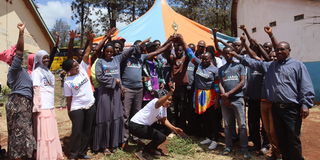Marsabit women and youth decry mental health challenges

Women and youth in Marsabit have decried rising mental health challenges.
The number of people battling the challenges has reportedly been on the rise in the county in the last two years when the region suffered ethnic attacks, starvation and massive loss of livestock to droughts.
Speaking during a three-day workshop organized by the Inter-religious Council of Kenya, Marsabit youths and women said the mental health issues were becoming a key concern in the region.
National Muslim Leaders Forum (NAMLEF) ambassador Daki Duba who is also a psychology expert said a special focus should be directed to Marsabit as a zone hit by psychosocial distress and mental ill-health.
“Many residents in this county are grappling with depression which is tied to everything that is going on in this region ranging from security crises, drought, gender-based violence, high divorce prevalence, and drug and substance abuse. All these are causing mental stability in Marsabit,” Ms Duba said.
The residents were struggling to handle depression and mental health challenges that increased sharply in the last two years, the meeting heard.
However, only a few residents visited various health facilities to seek psychological support as a result of depression.
This is due to high level of illiteracy with locals not aware of where to seek help thus leading to most of the cases going undocumented.
Ms Duba called on the government and other stakeholders to help take the region’s mental health from the shadow of stigma and discrimination and bring it to the centre of the public health policy.
She tied the daunting mental challenges to social ills and calamities that had bedeviled the region including deep-seated ethnic animosity and killings, drought, gender-based violence and drug and substance abuse.
A high number of residents lost their livestock which they considered their economic mainstay and for nutrition thus exposing them to starvation.
Others were also deprived of their livelihood, property destroyed, or their loved ones killed during the ethnic clashes that intensified between 2021 and 2022.
Ms Duba wanted a solid and inspiring basis to be formed by the government, policymakers, NGOs, and other stakeholders or even WHO to build solutions to improve the quality of life of the residents.
She also called on the affected persons to come out and seek help.
Marsabit Central Chief Dominic Fabiano attributed most of the mental health cases in the region to sustained ethnic attacks, gender-based violence, drought, and drug abuse among youths.
Marsabit Women of Faith member Amina Aila said women from different religions had decided to join hands to fight gender-based violence, negative ethnicity, and drug and substance abuse.
“I strongly believe that from now onwards, our common future should encompass investments in mental health promotion, and in the development of community-based, integrated mental health services for empowered Marsabit residents,"Ms Aila said.
Ms Aila said the collaboration and unity of the county women stood at the heart of combating all the causes of mental challenges.
Improving mental health was one of the biggest challenges facing the majority of Marsabit women, adding that the problems affected at least one in four people at some time in their lives.
Her colleague Naomi Woche said that only little was known about mental health care and treatment, especially among the residents living in the remote areas.
“Majority of the poor Marsabit women have been bearing the brunt of all sorts of social ills including negative ethnicity, gender-based violence, and calamities but today we’ve all agreed unanimously to be change agents,” Ms Woche said.
She held that getting to the bottom of the mental health challenges in the county was essential despite the gaping loopholes that still existed.
According to the WHO’s September 2021 report, depression is a common illness worldwide, with an estimated 3.8 percent of the population affected, including 5 percent among adults and 5.7 percent among people older than 60 years.
Approximately 280 million people in the world have depression.





